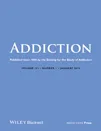| Titre : | From cannabis initiation to daily use: educational inequalities in consumption behaviours over three generations in France (2016) |
| Auteurs : | S. LEGLEYE ; M. KHLAT ; A. MAYET ; F. BECK ; B. FALISSARD ; N. CHAU ; P. PERETTI-WATEL |
| Type de document : | Article : Périodique |
| Dans : | Addiction (Vol.111, n°10, October 2016) |
| Article en page(s) : | 1856-1866 |
| Langues: | Anglais |
| Discipline : | EPI (Epidémiologie / Epidemiology) |
| Mots-clés : |
Thésaurus géographique FRANCEThésaurus mots-clés CANNABIS ; INITIATION ; USAGE REGULIER ; NIVEAU D'ETUDES ; COHORTE ; GENERATION ; TRAJECTOIREOrganismes INPES |
| Résumé : |
Aims: The diffusion of cannabis initiation has been accompanied by a reversal in the educational gradient: contrary to older generations, the less educated in recent generations are more likely to initiate than the more educated. We tested whether the educational gradient for the transition from initiation to daily use evolved in the same way.
Design/setting: A French telephone random survey conducted in 2010 (21 818 respondents aged 15-64 years), asking interviewees about their ages at initiation to daily use, if any. Participants: A total of 6824 cannabis initiators aged 18-64 years at data collection. Three birth cohort groups (generations) were compared: 1946-60 (n = 767), 1961-75 (n = 2632) and 1976-92 (n = 3425) with, respectively, 47, 42 and 45% of women. Measures: Risks of transition to daily use from ages 11-34 were compared through time-discrete logistic regressions and educational gradients were quantified through a relative index of inequality (RII). Control variables include age and time-varying variables (ages at tobacco daily use, at first drunkenness and at first other use of an illicit drug in a list of 13 products). Findings: Twenty-four per cent of the initiators reported daily use before age 35, the proportions tripling from the oldest to the youngest generation (from 11.7 to 38.6% in men, from 7.7 to 22.2% in women). Whatever the generation, the less educated initiators more often shifted to daily use than the most educated: from the oldest to the youngest generation, RII = 2.13, 95% confidence interval (CI) = [0.65, 7.02]; 2.19 95% CI = [1.33, 3.63]; and 2.24, 95% CI = [1.60, 3.15] in men; RII = 3.31, 95% CI = [0.75, 14.68]; 3.17, 95% CI = [1.49, 6.76]; and 3.56, 95% CI = [2.07, 6.14] in women, respectively. Conclusion: In France, the risk of transition from cannabis initiation to daily use has remained consistently higher among less educated cannabis initiators over three generations (1946-60, 1961-75, 1976-92), in contrast to what is observed for initiation. |
| Domaine : | Drogues illicites / Illicit drugs |
| Refs biblio. : | 71 |
| Affiliation : | INSERM, Mental Health in Public Health, Université Paris-Sud, Université Paris-Saclay, Villejuif ; Institut national des études démographiques, Paris, France |
| Cote : | Abonnement |
 Accueil
Accueil



